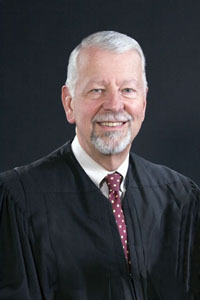
Ever since he struck down Proposition 8 in 2010, former federal judge Vaughn Walker has maintained a certain distance from the case. That’s probably wise, given that the Supreme Court has yet to make a final determination on his ruling.
So when Walker called and invited me to hear him speak about LGBT legal issues before a gathering of 25 or so criminal defense attorneys Monday night, how could I resist?
At the meeting, Walker outlined the history of homosexuality and the law. Born in 1944, Walker said the breadth of change in how the courts perceive gay rights is something that “I could not have imagined in my wildest dreams.” For emphasis, he added that the shift has been “utterly unimaginable.”
Recalling that day in 2009 when he first noticed a complaint in his “in box” titled Perry v. Schwarzenegger, it was, he said, “my oh-shit moment.” He realized the importance of the case challenging Prop. 8, but said he never thought it would attract the media attention it has. The Prop. 8 case is, he said, “the gift that keeps on giving.”
To Walker, the most fascinating moment in the March 26 oral arguments at the Supreme Court was this exchange between Justice Sonia Sotomayor and Prop. 8 attorney Charles Cooper.
JUSTICE SOTOMAYOR: Outside of the - outside of the marriage context, can you think of any other rational basis, reason, for a state using sexual orientation as a factor in denying homosexuals benefits or imposing burdens on them? Is there any other rational decision ... that the Government could make? Denying them a job, not granting them benefits of some sort, any other decision?
MR. COOPER: Your Honor, I cannot. I do not have any -- anything to offer you in that regard.
It was, said Walker, “a remarkable exchange” highlighting the extent to which equal treatment for gays and lesbians has become embedded in our culture.
